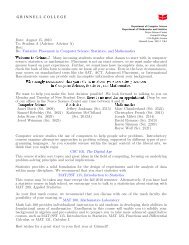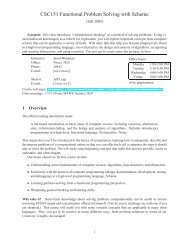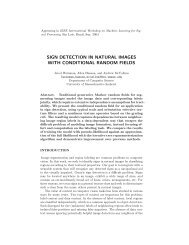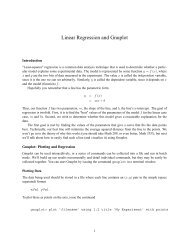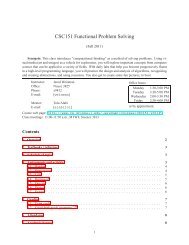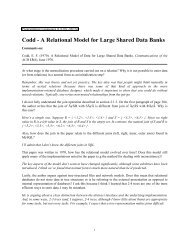CSC213 Operating Systems and Parallel Algorithms - Computer ...
CSC213 Operating Systems and Parallel Algorithms - Computer ...
CSC213 Operating Systems and Parallel Algorithms - Computer ...
You also want an ePaper? Increase the reach of your titles
YUMPU automatically turns print PDFs into web optimized ePapers that Google loves.
Week Topic Week Topic<br />
1 OS overview 8 Networks <strong>and</strong> sockets<br />
2 <strong>Computer</strong> organization 9 <strong>Parallel</strong> computation<br />
3 Processes <strong>and</strong> threads 10 <strong>Parallel</strong> analysis<br />
4 Process scheduling 11 File management<br />
5 Synchronization 12 Protection <strong>and</strong> securiy<br />
6 Deadlock 13 Distributed computation<br />
7 Memory management 14 Current OS topics<br />
Assignments <strong>and</strong> Activities<br />
Under a normal 16 credit load, I expect that you will spend at least 40 hours per week on your studies (class<br />
time, homework, <strong>and</strong> studying). Thus, you should plan to spend 10 hours/week on work for this course.<br />
With class <strong>and</strong> lab time clocking in at 3 1 3 hours, you’ll have 62 3<br />
hours/week left for the following:<br />
Discussion Questions Throughout the term, you will be expected to submit an average of one discussion<br />
question per class meeting that pertains to that day’s reading. See the course web page for guidelines<br />
on question content <strong>and</strong> submission.<br />
Brief Exercises Questions that engage you in design justification <strong>and</strong>/or a deeper underst<strong>and</strong>ing of abstractions<br />
will be assigned regularly at the end of class <strong>and</strong> posted on the web page. (No more than one<br />
question per class–thus, 1-3 per week). These are due by the beginning of the following class (not<br />
the end, not even ten minutes in). If you have a clear underst<strong>and</strong>ing of the core issues, your answers<br />
should not be longer than one page (they will frequently be shorter, depending on your h<strong>and</strong>writing or<br />
word processor formatting), <strong>and</strong> they should not take you very long (perhaps 30 minutes) if you have<br />
a solid underst<strong>and</strong>ing of the issues. It is also my intent that these questions will be similar in nature to<br />
many that will be on the exams.<br />
Discussion of the class material with your classmates is of course encouraged. However, collaboration<br />
is not permitted on the exercises; engaging with the material yourself to discover what the<br />
relevant issues are will greatly increase your learning. The idea is for you to frequently practice analyzing<br />
system considerations <strong>and</strong> get feedback in a low-stakes framework.<br />
Grading of the exercises will be on a simple ternary scale:<br />
̌ for an adequate, sufficient response<br />
̌+ for a particularly clear or insightful response<br />
̌− for an unclear or insufficient response<br />
I expect most work will receive checks. Of course, no credit will be given if no response is submitted.<br />
No late submissions will be accepted.<br />
Significant Bits From time to time (typically on Mondays), one member of the class will present a five<br />
minute overview/preview/insight/review of a recent development in the broad area of “systems.” The<br />
idea is to establish a practice of following technological developments in the popular <strong>and</strong> technical<br />
press as well as research publication venues. In doing this, you will inform your classmates, at a high<br />
level, about something that relates to the course material in principle <strong>and</strong> goal, rather than necessarily<br />
a particular topic. Your presentation should include what the development is, why it is important, a<br />
bit about how it is/was done, <strong>and</strong> perhaps something on who did it. You will asked to do just one<br />
4



